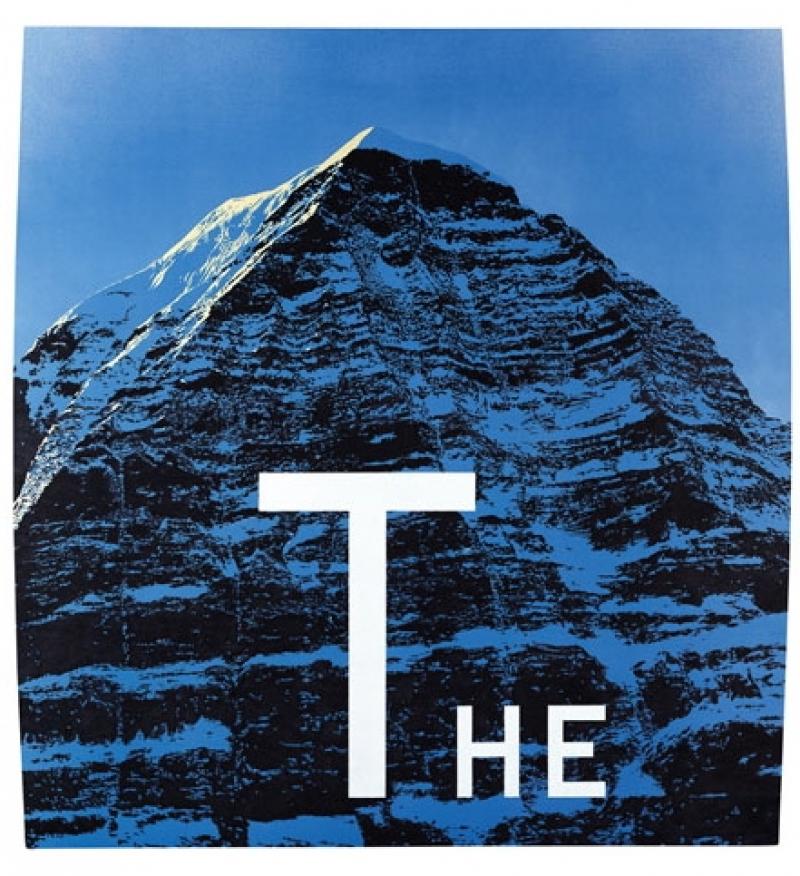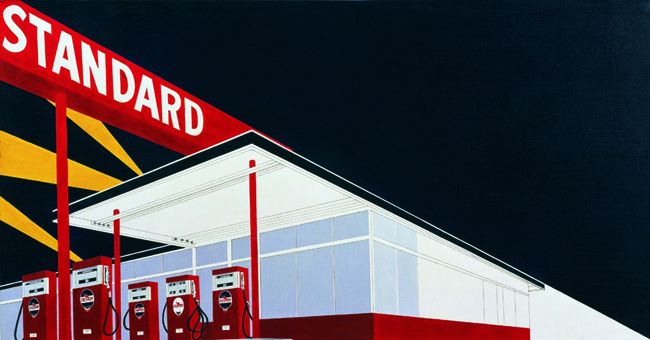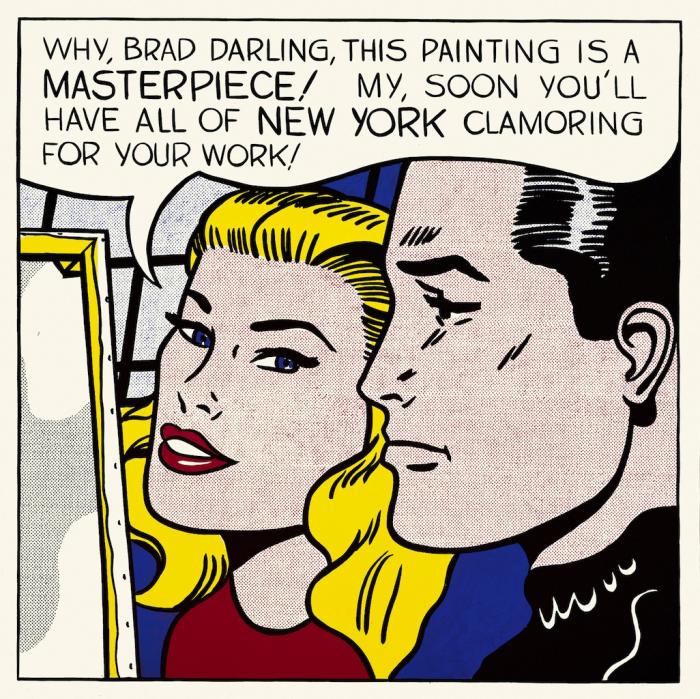Ed Ruscha: Fifty Years of Painting, Hayward Gallery | reviews, news & interviews
Ed Ruscha: Fifty Years of Painting, Hayward Gallery
Ed Ruscha: Fifty Years of Painting, Hayward Gallery
First British retrospective for a modern master

West Coast pop art always was a poor relation to the world-beating New York original. Beside the Big Apple titans – Andy Warhol, Roy Lichtenstein and Claes Oldenburg – LA painters such as Ed Ruscha, Robert Irwin and John Altoon remained essentially local figures. Or that’s certainly the way it has looked from this side of the pond.
While New York pop eschewed the autobiographical and the anecdotal, situating itself in a brutally mechanistic present in which it was forever 1962, Ruscha’s paintings with their abstracted gas stations and suburban homilies are tinged with a vernacular Americanness that remains ambiguous, but is born out of the artist’s own life experience. At 19 Ruscha left his home in Oklahoma City, driving along the mythic Route 66 to California to enrol in an art school sponsored by, of all people, Walt Disney. He studied graphic design and typesetting alongside fine art, and the interplay of words and images has remained a constant in his art over five decades. His deadpan disjunctions of sounds, appearances and meanings are never less than witty and occasionally laugh-out-loud funny
Oof from 1963 takes the kind of comic-book sound that Lichtenstein makes explicit in his images, and reduces it to a hermetic Zen abstraction of yellow letters on blue. In Hurting the Word Radio from 1964, the letters are squeezed with meticulously painted clamps in a way that does look weirdly painful. If these early works tells us little new about their period, they remain remarkably fresh. Indeed, such is the current influence of early pop and neo-Dada that these paintings might have been created by a thirty-something artist of today.
 By 1966, Ruscha had hit on his best-known image, Standard Gas Station (pictured above), the building squeezed into a narrow diagonal perspective that has become in effect the artist's own logo; the word "Standard", both a brand name and a gnomic text in its own right.
By 1966, Ruscha had hit on his best-known image, Standard Gas Station (pictured above), the building squeezed into a narrow diagonal perspective that has become in effect the artist's own logo; the word "Standard", both a brand name and a gnomic text in its own right.
While exhibitions by contemporary artists tend to cultivate a distant, even anonymous feel, Ruscha’s droll pronouncements are used liberally throughout the exhibition. Of The LA County Museum of Art from 1965, which shows the then newly opened museum on fire, he says, "I knew at the time I started the picture I was going to assault that building somehow." Indeed, for all his conceptual canniness, Ruscha’s utterances have a quality of hickory-tinged folk wisdom: "The most an artist can do is start something and not give the whole story – that’s where mystery begins."
If some of his visual jokes are pat one-liners you don’t need to see to get the point – "It’s a Small World" is just a tiny globe floating in a void – his best work is imbued with a deeper sense of ambiguity. Cryptic phrases drawn from everyday life – Wen Out for Cigrets N Never Came Back or Japan is America – float over chocolate-box sunsets and LA nightscapes in his 1980s paintings: an effect that feels part sculptural, part cinematic. A later series of monochrome airbrushed paintings of archetypal American images – suburban houses, a New England church, a howling coyote – have an eerily numinous feel.
This is a hugely entertaining exhibition that achieves the rare feat of making you actually like the artist as a human being. And stripped of its usual cluttering screens, the Hayward has seldom looked better, its 1960s Brutalist architecture perfectly complementing the tongue-in-cheek alienation of Ruscha’s paintings.
In the final room his laconic cool reaches its apotheosis in clichéd images of the American sublime, vast mountainscapes that reduce into meaningless marks as you move closer, over which float blunt, quasi-commercial pronouncements: Baby Jet, Parking for House of Blues or simply The. The images are banal, the language almost drained of meaning, yet the effect is peculiarly and paradoxically transcendent.
GREAT POP ART RETROSPECTIVES
Allen Jones, Royal Academy. A brilliant painter derailed by an unfortunate obsession
Andy Warhol: The Portfolios, Dulwich Picture Gallery. An exhibition of still lifes which are anything but still
 Lichtenstein: A Retrospective, Tate Modern. The heartbeat of Pop Art is given the art-historical credit as he deserves (pictured above, Lichtenstein's Masterpiece, 1962)
Lichtenstein: A Retrospective, Tate Modern. The heartbeat of Pop Art is given the art-historical credit as he deserves (pictured above, Lichtenstein's Masterpiece, 1962)
Patrick Caulfield, Tate Britain. A late 20th-century great emerges into the light
Pauline Boty: Pop Artist and Woman, Pallant House Gallery. The paintings are wonderful, but the curator does a huge disservice to this forgotten artist
Richard Hamilton, Tate Modern /ICA. At last, the British 'father of Pop art' gets the retrospective he deserves
Explore topics
Share this article
The future of Arts Journalism
You can stop theartsdesk.com closing!
We urgently need financing to survive. Our fundraising drive has thus far raised £49,000 but we need to reach £100,000 or we will be forced to close. Please contribute here: https://gofund.me/c3f6033d
And if you can forward this information to anyone who might assist, we’d be grateful.

Subscribe to theartsdesk.com
Thank you for continuing to read our work on theartsdesk.com. For unlimited access to every article in its entirety, including our archive of more than 15,000 pieces, we're asking for £5 per month or £40 per year. We feel it's a very good deal, and hope you do too.
To take a subscription now simply click here.
And if you're looking for that extra gift for a friend or family member, why not treat them to a theartsdesk.com gift subscription?
more Visual arts
 'We are bowled over!' Thank you for your messages of love and support
Much-appreciated words of commendation from readers and the cultural community
'We are bowled over!' Thank you for your messages of love and support
Much-appreciated words of commendation from readers and the cultural community
 Photo Oxford 2025 review - photography all over the town
At last, a UK festival that takes photography seriously
Photo Oxford 2025 review - photography all over the town
At last, a UK festival that takes photography seriously
![SEX MONEY RACE RELIGION [2016] by Gilbert and George. Installation shot of Gilbert & George 21ST CENTURY PICTURES Hayward Gallery](https://theartsdesk.com/sites/default/files/styles/thumbnail/public/mastimages/Gilbert%20%26%20George_%2021ST%20CENTURY%20PICTURES.%20SEX%20MONEY%20RACE%20RELIGION%20%5B2016%5D.%20Photo_%20Mark%20Blower.%20Courtesy%20of%20the%20Gilbert%20%26%20George%20and%20the%20Hayward%20Gallery._0.jpg?itok=7tVsLyR-) Gilbert & George, 21st Century Pictures, Hayward Gallery review - brash, bright and not so beautiful
The couple's coloured photomontages shout louder than ever, causing sensory overload
Gilbert & George, 21st Century Pictures, Hayward Gallery review - brash, bright and not so beautiful
The couple's coloured photomontages shout louder than ever, causing sensory overload
 Lee Miller, Tate Britain review - an extraordinary career that remains an enigma
Fashion photographer, artist or war reporter; will the real Lee Miller please step forward?
Lee Miller, Tate Britain review - an extraordinary career that remains an enigma
Fashion photographer, artist or war reporter; will the real Lee Miller please step forward?
 Kerry James Marshall: The Histories, Royal Academy review - a triumphant celebration of blackness
Room after room of glorious paintings
Kerry James Marshall: The Histories, Royal Academy review - a triumphant celebration of blackness
Room after room of glorious paintings
 Folkestone Triennial 2025 - landscape, seascape, art lovers' escape
Locally rooted festival brings home many but not all global concerns
Folkestone Triennial 2025 - landscape, seascape, art lovers' escape
Locally rooted festival brings home many but not all global concerns
 Sir Brian Clarke (1953-2025) - a personal tribute
Remembering an artist with a gift for the transcendent
Sir Brian Clarke (1953-2025) - a personal tribute
Remembering an artist with a gift for the transcendent
 Emily Kam Kngwarray, Tate Modern review - glimpses of another world
Pictures that are an affirmation of belonging
Emily Kam Kngwarray, Tate Modern review - glimpses of another world
Pictures that are an affirmation of belonging
 Kiefer / Van Gogh, Royal Academy review - a pairing of opposites
Small scale intensity meets large scale melodrama
Kiefer / Van Gogh, Royal Academy review - a pairing of opposites
Small scale intensity meets large scale melodrama
 Jenny Saville: The Anatomy of Painting, National Portrait Gallery review - a protégé losing her way
A brilliant painter in search of a worthwhile subject
Jenny Saville: The Anatomy of Painting, National Portrait Gallery review - a protégé losing her way
A brilliant painter in search of a worthwhile subject
 Abstract Erotic, Courtauld Gallery review - sculpture that is sensuous, funny and subversive
Testing the boundaries of good taste, and winning
Abstract Erotic, Courtauld Gallery review - sculpture that is sensuous, funny and subversive
Testing the boundaries of good taste, and winning
 Edward Burra, Tate Britain review - watercolour made mainstream
Social satire with a nasty bite
Edward Burra, Tate Britain review - watercolour made mainstream
Social satire with a nasty bite

Add comment